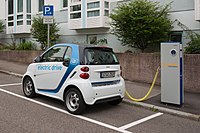As of March 2022 [update], there were about 4,900 electric vehicles (including plug-in hybrid vehicles) in Rhode Island, equivalent to 0.7% of all vehicles in the state. [1] [2]
Government policy
In March 2022, the state government introduced a $2,500 tax rebate for purchases of electric vehicles, and $1,500 for plug-in hybrid vehicles. [3]
Charging stations
As of October 2021 [update], there were about 210 public AC level 2 charging stations and 25 public DC charging stations in Rhode Island. [4]
The Infrastructure Investment and Jobs Act, signed into law in November 2021, allocates US$22 million to charging stations in Rhode Island. [5]
As of 2022 [update], the state government recognizes I-95 as a potential "alternative fuel corridor" with plans for charging stations every 50 miles (80 km). [6]
References
- ^ Kuffner, Alex (March 14, 2022). "RI will once again offer rebates on electric cars. Here's how it will work". The Providence Journal. Retrieved May 25, 2022.
- ^ "Which U.S. States Are Best For Electric Vehicles?". CleanTechnica. September 18, 2022. Retrieved October 9, 2022.
- ^ Addleman, Brent (March 17, 2022). "Rhode Island electric vehicle program comes with rebates". The Center Square. Retrieved April 15, 2022.
- ^ Prevost, Lisa (October 14, 2021). "For renters in Rhode Island, charging is a barrier to electric vehicle adoption". Energy News Network. Retrieved April 15, 2022.
- ^ "RI Delegation Delivers $3.38 Million to Boost RI's Electric Vehicle Charging Infrastructure". February 13, 2022. Retrieved May 25, 2022.
- ^ Bentley, Jimmy (October 4, 2022). "EV Charging Stations Move Forward: What It Means In Rhode Island". Patch.com. Retrieved October 9, 2022.

